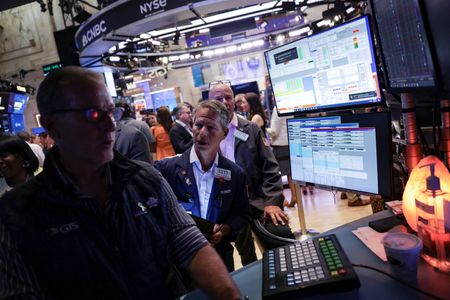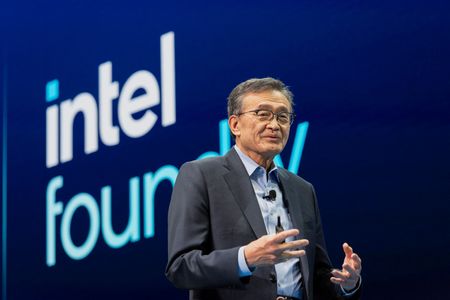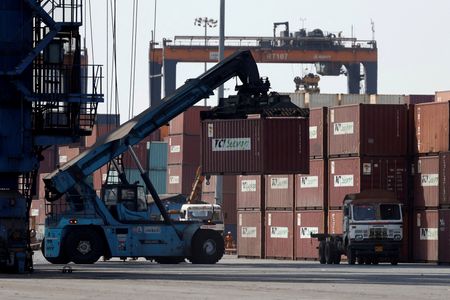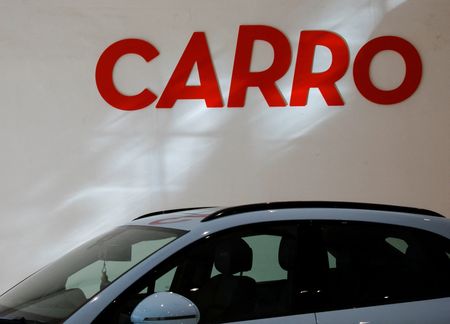By Chris Prentice and Alun John
NEW YORK/LONDON (Reuters) -Wall Street indexes gained on largely upbeat corporate earnings, and U.S. yields also rose on Wednesday, while European shares closed flat and broke a two-day winning streak.
U.S. President Donald Trump issued an executive order imposing an additional 25% tariff on goods from India, saying the country has imported Russian oil.
Oil prices reversed earlier gains and touched fresh lows after U.S. Secretary of State Marco Rubio indicated there would be an announcement later on Wednesday regarding potential sanctions against Russia over its war in Ukraine. [O/R]
MSCI’s gauge of stocks across the globe rose 0.72% to 933.94.
On Wall Street, the Dow Jones Industrial Average rose 0.32% to 44,254.95, the S&P 500 gained 0.76% to 6,347.26 and the Nasdaq Composite added 1.16% to 21,160.02.
“Earnings are seeing a mixed reaction. Particularly for a few of the AI names, expectations were just extremely high, but by and large, the earnings in aggregate have been good enough to keep a floor under the market,” said Ross Mayfield, investment strategy analyst at Baird.
Europe’s broad STOXX 600 index closed 0.06% lower, dragged down by healthcare stocks after Trump announced a tariff plan for the pharmaceutical sector.
MSCI’s broadest index of Asia-Pacific shares outside Japan closed lower by 0.08% to 654.33, while Japan’s Nikkei rose 0.60% to 40,794.86.
The health of the U.S. economy is a major focus for markets, and Wall Street closed lower on Tuesday after data showed services sector activity unexpectedly flatlined in July.
That reinforced the message from Friday’s soft jobs data, which caused markets to significantly increase bets on the Federal Reserve cutting rates in September.
“There’s this tug-of-war going on between the more concrete signs that we have seen that the U.S. economy is slowing and the fact that rate cuts are coming, which removes some of the pressure on valuations,” said Samy Chaar, chief economist at Lombard Odier.
Traders have been focused on tariff impacts.
“The market is more focused on the fact that we’re not getting maximalist tariffs, but I wonder if it isn’t focusing enough on the fact that we are still getting something moderate, and more could be coming, pharmaceuticals for example,” Chaar said.
Trump on Tuesday said he would announce tariffs on semiconductors and chips in the next week or so, while the U.S. would initially impose a “small tariff” on pharmaceutical imports before increasing it substantially in a year or two.
He said the U.S. was close to a trade deal with China, and he would meet his Chinese counterpart Xi Jinping before the end of the year if an agreement was struck.
Brazil’s government has filed a consultation request at the World Trade Organization over U.S. tariffs.
In the government bond market, Treasury yields gained ground. The yield on benchmark U.S. 10-year notes rose 4.2 basis points to 4.238%, from 4.196% late on Tuesday.
Fed funds futures imply a 94% chance of a rate cut next month, with at least two cuts priced in for this year, according to the CME’s FedWatch.
Investors are waiting for Trump’s pick to fill a coming vacancy on the Fed board of governors. Trump said the decision will be made soon, while ruling out Treasury Secretary Scott Bessent as a contender to replace current chief Jerome Powell, whose term ends in May 2026.
The euro was 0.71% higher at $1.1656. [FRX/]
The dollar index, which measures the greenback against a basket of currencies including the yen and the euro, fell 0.53% to 98.20.
Brent oil futures lost 0.95% to $67 a barrel and U.S. crude fell 1.14% to $64.43. [O/R]
Spot gold prices fell 0.33% to $3,369.62 an ounce. U.S. gold futures settled flat at $3,433.4. [O/R]
(Reporting by Stella Qiu in Sydney and Alun John in LondonAdditional reporting by Nikhil Sharma and Pranav Kashyap in Bengaluru; Editing by Mark Potter, Bernadette Baum, Rod Nickel)











